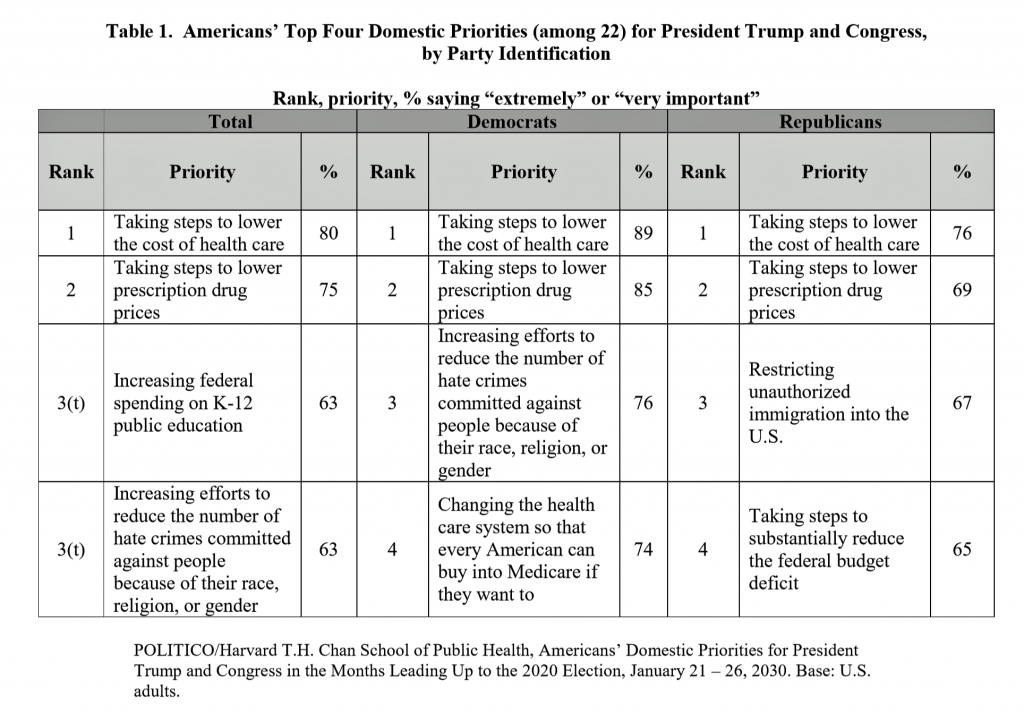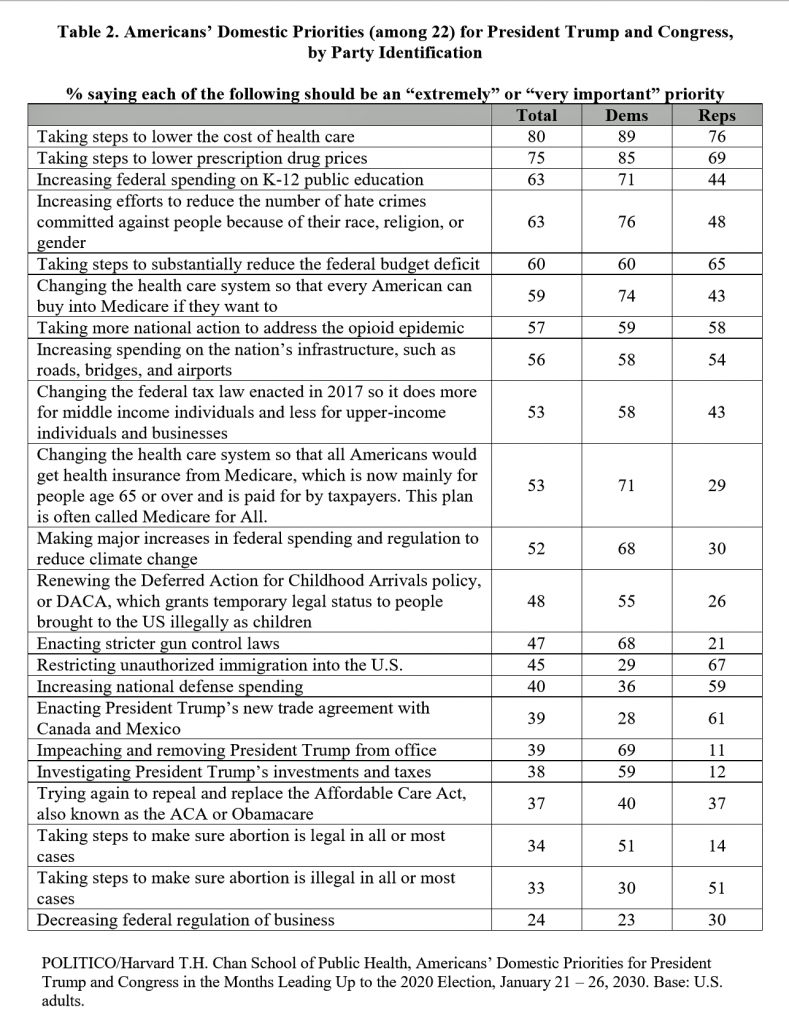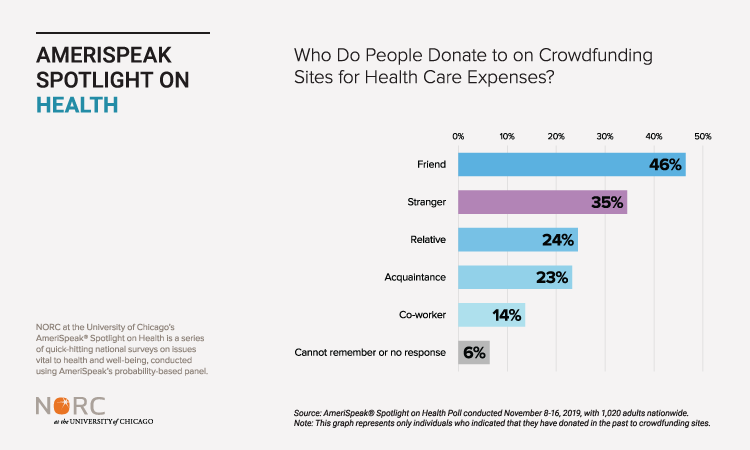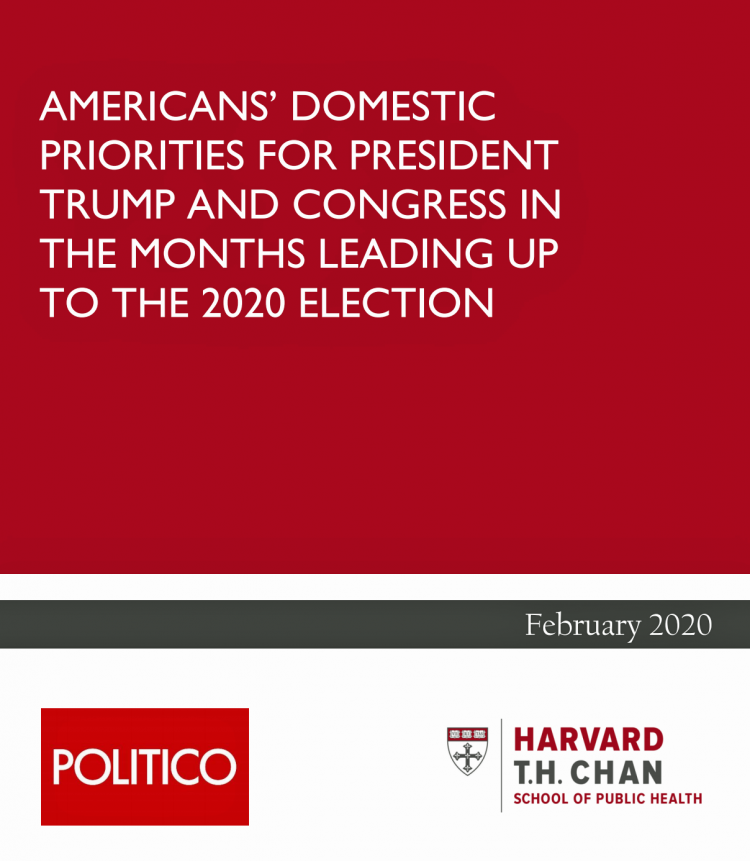Health care pocketbook issues rank first and second place for Americans in these months leading up to the 2020 Presidential election, according to research from POLITICO and the Harvard Chan School of Public Health published on 19th February 2020.
 This poll underscores that whether Democrat or Republican, these are the top two domestic priorities among Americans above all other issues polled including immigration, trade agreements, infrastructure and regulations.
This poll underscores that whether Democrat or Republican, these are the top two domestic priorities among Americans above all other issues polled including immigration, trade agreements, infrastructure and regulations.
The point that Robert Blendon, Harvard’s long-time health care pollster, notes is that, “Even among Democrats, the top issues…(are) not the big system reform debates…They’re worried about their own lives, their own payments, and what they can afford.”
In other words, Americans are more worried about their current health care stressors than voting for a candidate on the basis of a national health care plan…in the immediate/short-run.
Underpinning this Purple Convergence for Health is that whether a Democrat or Republican, U.S. health citizens are highly concerned about their personal out-of-pocket costs for medical services and insurance, as well as prescription drug coverage. This links to protecting coverage with pre-existing conditions and surprise medical bill concerns, as well.
 There’s another interesting data point in the detail in the second busy table. Cast your eyes to the fourth to the last line item: “trying again to repeal and replace the Affordable Care Act (aka ACA or Obamacare”). Look across the data for total, Dems and Reps and you’ll see 37%, 40% and 37%, respectively. This shows that roughly 4 in 10 Americans whether Democrat or Republican rank repeal and replace as a less important priority. Here, cross-party, Americans are on the same page, less concerned overall with repeal-and-replacing the ACA.
There’s another interesting data point in the detail in the second busy table. Cast your eyes to the fourth to the last line item: “trying again to repeal and replace the Affordable Care Act (aka ACA or Obamacare”). Look across the data for total, Dems and Reps and you’ll see 37%, 40% and 37%, respectively. This shows that roughly 4 in 10 Americans whether Democrat or Republican rank repeal and replace as a less important priority. Here, cross-party, Americans are on the same page, less concerned overall with repeal-and-replacing the ACA.
Further up the priorities is also a cross-party kumbaya about taking steps to substantially reduce the federal budget deficit — about 6 in 10 Americans ranking this a high priority.
Health Populi’s Hot Points: In the past couple of days I’ve been brainstorming with Larry Dobrow of Medical Marketing & Media magazine and portal how mass media have been covering various health reform issues in 2020 leading up to the election. One of my observations/critiques of the media is that so many national publications across the political spectrum, left to right, haven’t done a good job connecting the dots between the various health reform issues and how to pay for these alternatives.
Recall from the Harvard Chan-POLITICO poll that most Democrats and Republicans prioritize dealing with the Federal deficit, which hit $1 trillion this year. While Democrats in Congress have been long labeled as prolific spendings of the public purse who have been comfortable with running up deficits, the U.S. hit this stratospheric deficit under GOP leadership inside the Beltway.
We’re in a moment of Attention Deficit Disorder, Joe Queenan wrote in the Wall Street Journal earlier this week. “We don’t pay attention to the deficit,” he observed. His point was that consumers don’t have a context to put that $1 trillion number.

But health consumers in America certainly understand their personal and household financial exposure to health care in 2020. And that is health citizenship-bonding patient experience. Would that our policymakers and President address this universal call for medical bill cost relief.
In conclusion, let me leave you with this new poll from NORC on the growing phenomenon of crowd-funding health care costs. One in 5 Americans or someone in their household have contributed to a crowd-funding site to support someone’s medical bills. The bar chart illustrates NORC’s finding that half of the donations go to friends, one-third to strangers, a quarter to an acquaintance, and 14% to a co-worker.
This is one of the strongest signals that underpins the meaning of my book, HealthConsuming — that health care costs are consuming Americans’ financial health, emotional and mental health, and time required to navigate our fragmented, expensive and wasteful health system.





 I'm in amazing company here with other #digitalhealth innovators, thinkers and doers. Thank you to Cristian Cortez Fernandez and Zallud for this recognition; I'm grateful.
I'm in amazing company here with other #digitalhealth innovators, thinkers and doers. Thank you to Cristian Cortez Fernandez and Zallud for this recognition; I'm grateful. Jane was named as a member of the AHIP 2024 Advisory Board, joining some valued colleagues to prepare for the challenges and opportunities facing health plans, systems, and other industry stakeholders.
Jane was named as a member of the AHIP 2024 Advisory Board, joining some valued colleagues to prepare for the challenges and opportunities facing health plans, systems, and other industry stakeholders.  Join Jane at AHIP's annual meeting in Las Vegas: I'll be speaking, moderating a panel, and providing thought leadership on health consumers and bolstering equity, empowerment, and self-care.
Join Jane at AHIP's annual meeting in Las Vegas: I'll be speaking, moderating a panel, and providing thought leadership on health consumers and bolstering equity, empowerment, and self-care.